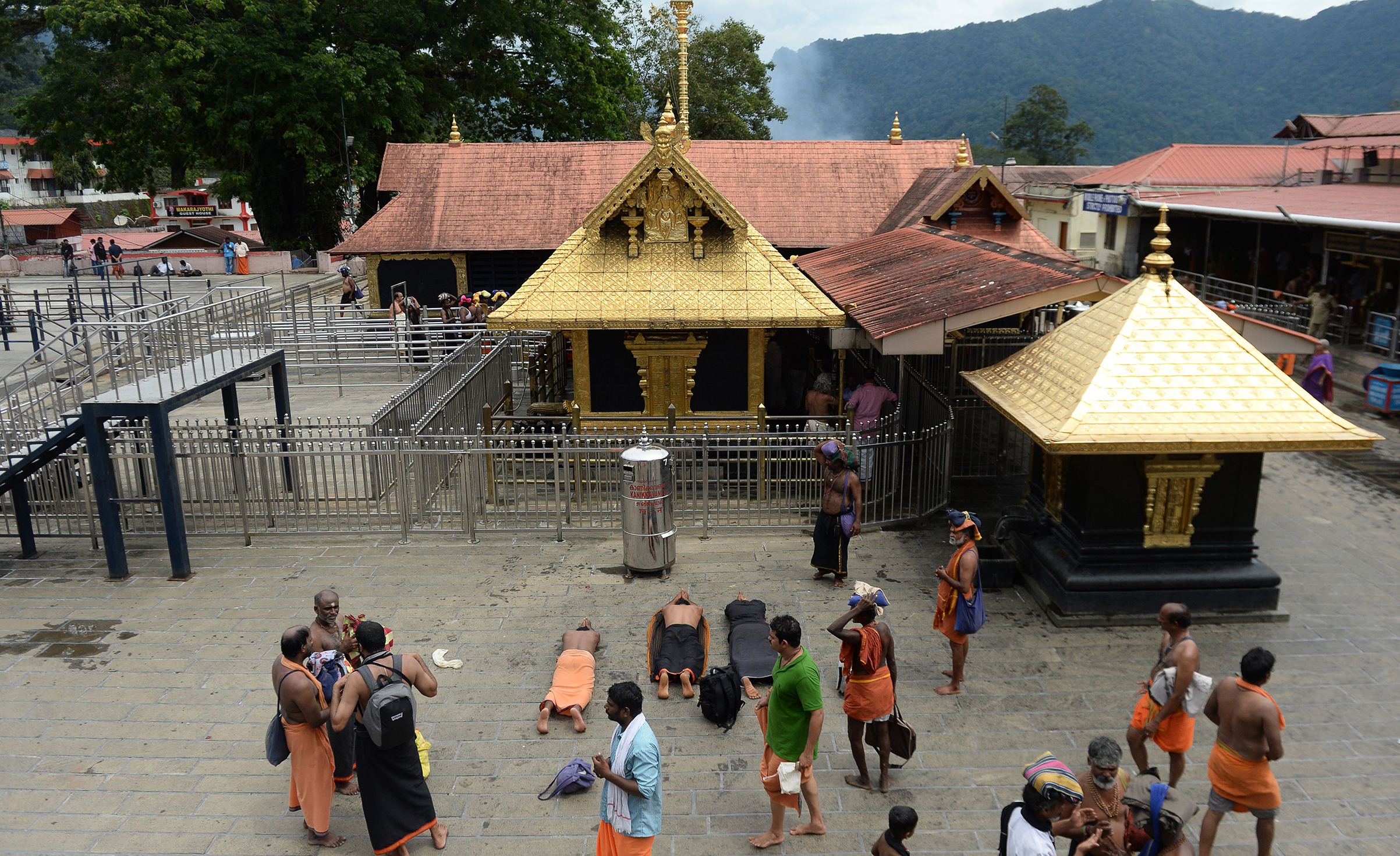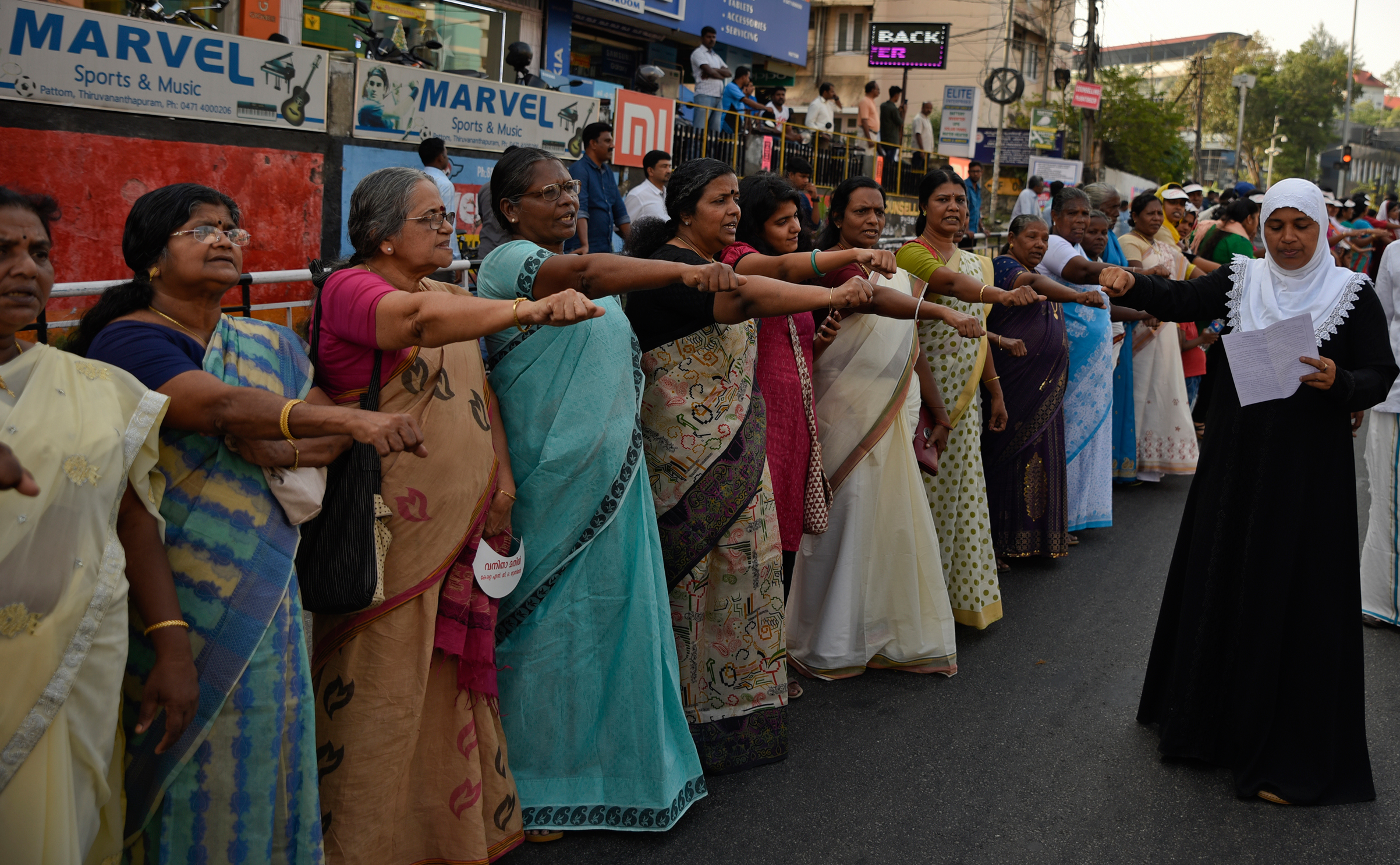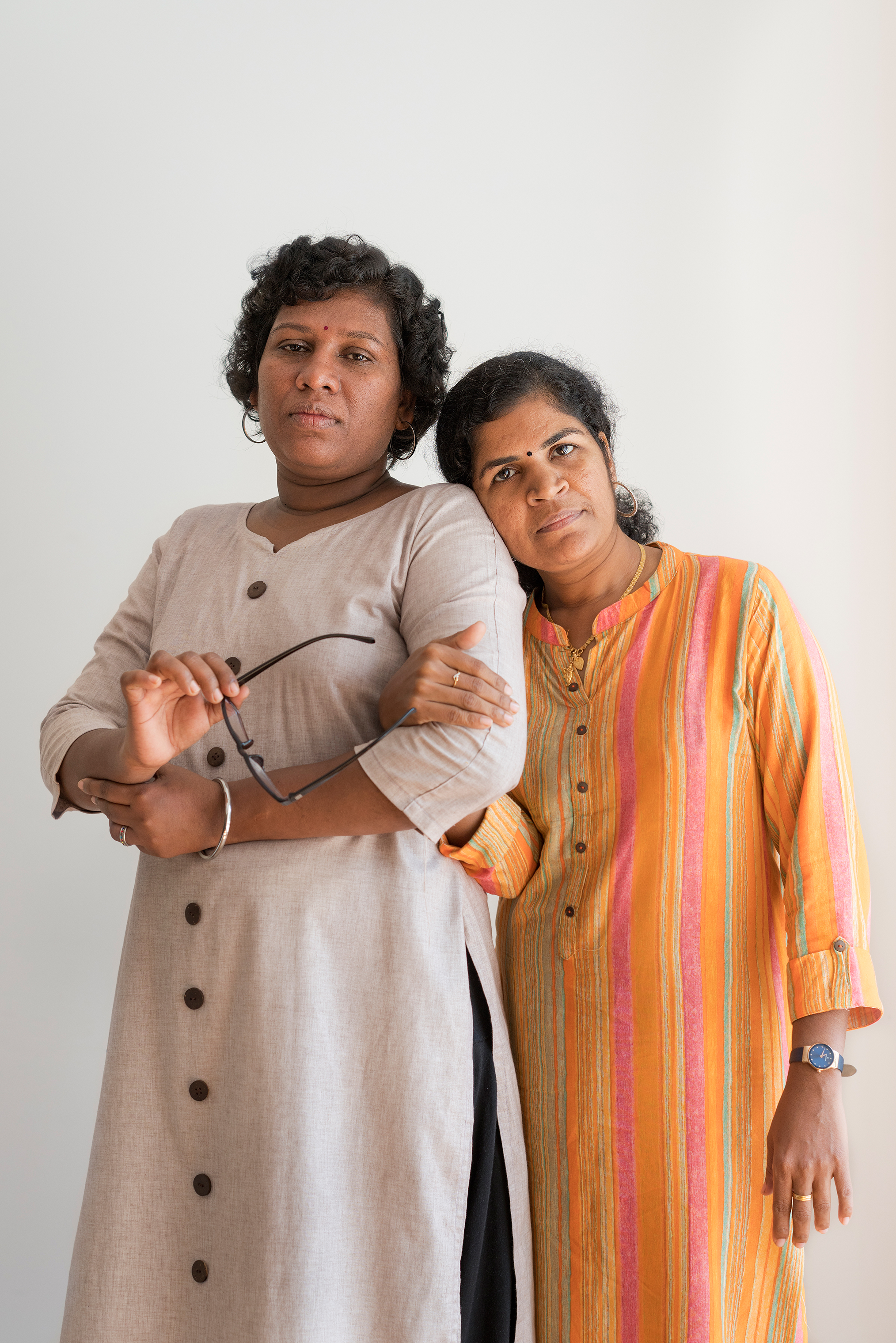Two women slump low in the backseat of an SUV, as a friend drives them to a third safehouse in three days. “You can’t be tracked on the move, so you can use your phones on the way,” he says, turning into a dark, winding road in the southern Indian state of Kerala.The women quickly switch their phones on and call home. It is the first time in over a week that they can speak to their families — a week in which they find themselves on the front line of a gender-equality battle raging in southern India.
On Jan. 2, 40-year-old law professor Bindu and 39-year-old government supplies officer Kanakadurga (per South Indian custom, both go by their first names only) entered the Lord Ayyappa temple in Sabarimala, southern Kerala. They became the first women to officially do so since the Supreme Court overturned a longstanding ban in September that prevented women of “menstruating age” — defined as between the ages of 10 and 50 — from entering the temple complex.
Believed to have been established before the 12th century, the Hindu temple receives more than 5 million visitors a year, making it one of the largest annual pilgrimages in the world. (The Supreme Court filing mentions 20 million pilgrims a year). The presiding deity is Lord Ayyappa, who is believed to have taken an oath of celibacy. Before they make the steep barefoot trek to the temple, pilgrims — until now men of all ages, children, and women over the age of 50 — prepare for Sabarimala by practicing celibacy and avoiding meat and leather.
Since the Supreme Court verdict, the Kerala government says that about 4,200 women have booked online for a visit, although local police say that only about 20 women have tried to enter the temple. (There are unconfirmed reports that eight other women have entered the temple since Jan. 1, including three Malaysian women of Tamil origin who are said to have entered the day before Bindu and Kanakadurga.)
Outraged male protesters surrounding the temple have chased and abused the women, and threatened to beat them up. After Bindu and Kanakadurga entered, the head priest shut the temple doors for an hour-long “purification ceremony.” Across Kerala, mobs claiming to be offended devotees are going on a rampage, damaging buses, burning effigies and throwing stones and crude bombs in the streets. One man has died, and hundreds have been injured. The Kerala police have arrested more than 5,700 people.
Many Hindus believe that the energy or chaitanya of a woman’s body is polluted during menstruation. Most temples allow women to enter as long as they are not on their period, but the Sabarimala temple is one of the few banning women of childbearing age altogether. In response to a 2006 petition spearheaded by women lawyers, the highest court of India declared that the Sabarimala rule is a violation of the right to equality, guaranteed in the Indian Constitution. The Kerala state government led by the Communist Party of India (Marxist) now hails Bindu and Kanakadurga as heroes, while the protesters say they have defiled the temple.
In India, the fight for women’s equality exists on several fronts. In 2012 after a young medical student was brutally raped and murdered in Delhi, a massive uprising focused on women’s safety, and public opposition to stronger rape laws. In the last year, the #MeToo movement came to India as women in media, entertainment and academia named their aggressors and demanded safer workplaces. Recognizing the climate, Prime Minister Narendra Modi’s central government has been pro-actively advertising programs for women’s education and menstrual health. But with a high-profile case of a Kerala nun accusing a Catholic priest of rape, and now Sabarimala, women’s-rights activists in India are facing one of its toughest battlefields: religion.
With national elections set to take place in April and May, the protests have turned into an ideological battle between the right and the left. The most vocal protesters are affiliated with Modi’s Hindu nationalist Bharatiya Janata Party (BJP), which historically had little political sway in Kerala, a highly literate, fertile region of the country with large Hindu, Muslim and Christian populations. But now, the BJP has found a way to enter Kerala politics by taking a stand against the women entering the temple in Sabarimala. The BJP officials argued their entry was a violation of Hindu tradition.
Meanwhile, communist state leader Pinarayi Vijayan has assured that his government would uphold the court verdict and provide police protection for women devotees visiting the temple. Parties in his left coalition — also often criticized for being male bastions — are espousing feminist values like never before. They led 5 million women, many of them state employees, in standing shoulder to shoulder on Jan. 1, forming a “women’s wall for renaissance.” They’re now planning a two-day celebration of menstruation as “not impure, but pure.”
At the center of the politicking, the two women who first entered the temple have been forced into hiding. On the evening of Jan. 4, the night they are allowed to turn their phones on, Bindu calls her 12-year-old daughter, Olga, named for the revolutionary Olga Benario Prestes killed in the Holocaust. As protesters and the media surrounded their home in Kozhikode, a district in north Kerala, Olga has had to move in with her mother’s friend. She is unfazed. “Amma, you don’t forget the aravana payasam, okay?” the girl says chirpily, reminding Bindu about the sacred rice and molasses sweet Sabarimala devotees always bring back after prayers. “I’m so proud of my wife, and of Kanakadurga,” Bindu’s husband Hariharan tells TIME over the phone. “They have paved a way for many other women to express their faith.”
Kanakadurga has no such support. Her family have not spoken to her since Dec. 24, when the pair made their first, failed attempt to enter Sabarimala. A police officer in her home district says her family received several death threats and have left to an undisclosed relatives’ house. In the car, Kanakadurga sends rapid voice messages on Whatsapp to friends and neighbors, letting them know she is fine, and if they can find out where her family is. “They’re angry with me because I risked my life, and now, theirs,” she says. “But I know that when I return home, we will sort things out.” Bindu touches her friend’s knee; the women who met just two weeks earlier now finish each other’s’ sentences.
“People will always spit at those trying to push for social change,” Kanakadurga says, noting that she and Bindu do not regret what they did. “We’ll be asked what’s the hurry to become equal, why us two, why today, why not tomorrow, or why this way. It’s part of any transition. I just appeal to my brothers on the streets to find some tolerance within them, and stop the violence in our name.”

In videos released to the media after their 3 a.m. visit to the temple on Jan. 2, Bindu and Kanakadurga wear black clothes, like most pilgrims to Sabarimala. In one short clip, the two rush down the back stairs after their visit; in another, they walk down the hill, past other devotees. Bindu pauses and beams at the phone camera. She asks the person holding the phone — a psychologist friend who helped them stay calm — to shoot her statement “to avoid fake news.”
“We just worshipped Ayyappan in Sabarimala and are going back,” she says in the local language, Malayalam. “As you can see, the real devotees of Sabarimala are not stopping us. Our visit has been very smooth.” A visibly nervous Kanakadurga smiles but refuses to say anything.
Bindu and Kanakadurga tell TIME they are two entirely divergent souls thrown together by a single common “vaashi,” or resolve. Bindu is a Dalit, a community formerly considered “untouchable,” who grew up in the district near the temple. The youngest of five children, she was raised by her illiterate mother after her parents separated. Throughout school, she accompanied her mother as she labored in paddy fields, plastic factories, and hotel kitchens. In 2001, she became the first in her family to go to college; she became a lawyer because her headmistress said it suited “stubborn girls.”
At the age of 18, Bindu met her future husband, Hariharan, at a leftist students’ group. In law college, Bindu took her baby daughter to class. She also joined the Communist Party of India (Marxist-Leninist), and eventually became its youngest female state coordinator. “My political awareness makes me stronger, but the media is trying to use it to tarnish my image,” she says, after the third television reporter in one evening asks her if she is a Maoist (an extreme leftist who believes in armed revolution to overthrow the state). Speaking in Malayalam, peppered with English she has taught herself, she clarifies that the party she was in is state-recognized and that she has never believed in armed rebellion. Eight years ago, Bindu says she tired of raging against the glass ceiling in communist parties, and quit. She now teaches in the School of Legal Studies in the coastal city of Thalassery, and runs a grocery shop with her husband. “I am agnostic. If I believe in something powerful, it is subaltern feminism,” she says, referring to the rights of women in the most oppressed classes.
Kanakadurga’s life has been more privileged. Descriptions of her childhood conjure up an ancestral home with a wide foyer and fat wooden pillars, games amid paddy fields, and a family temple in the backyard. She does not hide her pride when she says she is a high-caste Nair. Her left-leaning father was a clerk in the district court, and mother, a homemaker. But the house rules were set by her elderly, orthodox grandmother, the matriarch who read Hindu mythology and scriptures to Kanakadurga and her five siblings every evening.
“In such a family, it’s common for a lower caste servant to be served in a different plate in the backyard, and for no Muslim or Christian to ever enter our gates,” Kanakadurga says. She rebelled in her own quiet ways, sneaking in a Muslim best friend for a meal by planting a bindi on her forehead, writing romantic poetry, and bagging a government job soon after her arranged marriage. “My husband and I live a conservative life, we don’t want to challenge society or anything,” she says. “I am god-fearing, but I pick my battles.”
After the Supreme Court verdict, both Bindu and Kanakadurga voiced their desire to go to Sabarimala. Curious, they joined a few groups on Facebook and Whatsapp formed by secular activists and women who wanted to go to Sabarimala. Some planned to go in late December, an auspicious time. But as they watched protesters and police turning women devotees away from the temple, and threatening them, more and more women withdrew from the plan. On Dec. 22, Bindu and Kanakadurga, along with two other women, met for the first time in Thrissur, a town a 125 mile drive from Pamba, the base of Sabarimala. Bindu’s husband had dropped her to the railway station, and wished her luck. But Kanakadurga, whose husband had said her desire to go to Sabarimala was a “disgrace,” had told her family she had official work out of town. “If I had said where I was actually going, they would have locked me up in a room,” she says.
Strangers with a single mission, the four women made their journey to Sabarimala. On the way, the two other women received imploring calls from their families and decided to go home. On Dec. 24, as Bindu and Kanakadurga reached the base of the hill, protesters stopped them, and police removed them to avoid a potential riot. Angry and determined to continue their journey, Bindu and Kanakadurga went on hunger strike there until the police guaranteed them protection in line with the state government’s promise. As the police tried to find a safe way to help the women enter the temple, Bindu and Kanakadurga say they argued with each other — over whether they could count on the police, whether they should abort the plan, which route they should take, and several other details.
“Without Kanaka, I would probably have gone in hurriedly and gotten killed,” Bindu says. Kanakadurga adds, “Without Bindu, I would have returned home! Now, I have the satisfaction of having opened the door for any woman devotee to enter Sabarimala.” Her voice softens as she describes the lamp-lit idol of the seated Lord Ayyappa. She says it brought her more peace than any shrine she had seen before.

Hindus opposed to women entering the Sabarimala temple offer several reasons. “They can go to any other temple, can’t they?” says Sandeep Vachaspati, the BJP’s media coordinator for Kerala, and a member of the Save Sabarimala movement. He believes the temple entry movement is a ploy by activists to “put an end to Hindu values.” Modi has explained his party’s war on Indian Muslims’ practice of “triple talaq” or instant divorce, as a matter of Muslim women’s rights, but Sabarimala as tradition.
Many women in Kerala seem to want the status quo, where they get to go only after the age of 50. Padma Pillai, from Ready to Wait, a group of women who believe in waiting for menopause before going to Sabarimala, says that the courts shouldn’t intervene on this kind of religious matter, since not being allowed into Sabarimala doesn’t cause “any harm to the body, mind or even spiritual goals of a woman.” The Chennai-based People for Dharma is one of many groups who have filed petitions asking for a review of the judgement, which the Supreme Court will hear on Jan. 22.
The debate is being held not only in television studios and the parliament, but also in buses, trains, and living rooms in Kerala. Women repeatedly mention that Kanakadurga’s husband might leave her as punishment. (He has not said this). In the same breath, the pair are asked why they want to risk their lives for women’s rights, and why they did not dare to use the front entrance and walk among thousands of devotees and protestors. They’re called tools of the communist government. Their motives are questioned, their sanity doubted.
The demand for equal entry into religious spaces has historically been important to many larger struggles for social reform in India. Initially a pre-independence movement seeking equality for Dalits with upper-caste Hindus, in the past few years it has started to include women who seek parity with men. Sabarimala is not the first instance of women seeking entry into temples on par with men. In 2016, in response to a petition by women led by activist Trupti Desai, the Bombay High Court ended a 400-year-old custom by opening the Shani Shingnapur temple in the western state of Maharashtra to women. The same year, after a nationwide campaign called “Right to Pray” led by Muslim women and activists, the court lifted a ban on women entering the inner sanctum of the iconic Haji Ali Dargah in Mumbai. Across India, women are pushing the boundaries — in social struggles and, more often, through court battles.
When Kanakadurga and Bindu turn their phones off for another 24 hours to avoid tracking, all they want is to go home, resume their jobs, and wait for other women to pick up where they left off. “In a democratic country like India, the idea that men and women are not equal – even if sometimes, in some spaces, or some situations — is so dangerous,” says Kanakadurga. “My sons — all our kids — are watching this. I need to go home. They need to listen to my side of the story.”
- The 100 Most Influential People of 2024
- Coco Gauff Is Playing for Herself Now
- Scenes From Pro-Palestinian Encampments Across U.S. Universities
- 6 Compliments That Land Every Time
- If You're Dating Right Now, You're Brave: Column
- The AI That Could Heal a Divided Internet
- Fallout Is a Brilliant Model for the Future of Video Game Adaptations
- Want Weekly Recs on What to Watch, Read, and More? Sign Up for Worth Your Time
